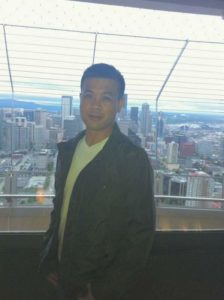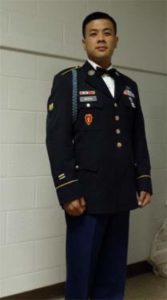
Friends, neighbors and guardians are painting a complex picture of Albert Wong, a decorated Afghanistan War veteran who authorities say shot and killed three people before killing himself at a Veteran Affairs rest home in the Napa wine country.
The Press Democrat reports Wong had a troubled youth and spent most of his adolescence in a San Francisco Bay Area foster home with six foster brothers.
According to his oldest adopted brother, Wong once pushed one of his brothers down the stairs, breaking his leg. Tyrone Lampkin said Wong’s father died when he was eight.
Despite that, his guardians, Cissy and Matthew Sherr, described him as a “happy young man” and would never suspect he would be capable of killing three people.

Wong spent a year in Afghanistan beginning in 2011 and was clearly affected by his experience, and had trouble sleeping.
“They had to look out for each other lives. He saw what we see that we think we only see in the movies. Albert had to see that,” said Cissy Sherr.
Ricardo Saenz, a friend of Wong from their days together in military training, said Wong became homeless after being kicked out of a VA program a few weeks ago.
“He was trying to put his feet on the ground and it was hard for him,” Saenz said to the Sacramento Bee. “I’m disappointed he didn’t ask for help. None of this should have happened. He should have taken help.”
Jeffrey Watts, another friend who was deployed with Wong in Afghanistan, said he kept in touch with his friend every two weeks.
“Everyone that knew him loved and respected him. He was, hands down, the best soldier we had. He was hard working and dedicated,” Watts said to the Bee.
Former neighbors of Wong in Napa said the incident gave them chills. “I can’t imagine somebody that sick being around here, especially having kids and being a very family focused neighborhood.”
His adopted brother Lampkin told ABC7 had many good qualities, but lost his way.
“Albert was a good person, he really was a good person,” said Lampkin to the Bee. “I heard he stopped taking his meds and started drinking a lot … He never told me, he never told me.”
AsAmNews has Asian America in its heart. We’re an all-volunteer effort of dedicated staff and interns. Check out our Facebook page and our Twitter feed, Please consider interning, joining our staff or submitting a story for consideration.


RE: Friends and family Describe VA Rest Home Shooter as troubled. Yet Happy: So sad. War is terrifying, horrifying and continues to destroy people forever. It does not stop. One last trigger of abandonment and desertion was the last straw. Being asked to leave without a plan of where his next place was or being told to leave vs. dealing with his hurt and anger just did him in. So sad for all the victims and their families.
RE: Friends and family describe VA Rest Home Shooter as troubled, yet happy: I suspect that his problems didn’t start with war, and that’s the first misperception that needs to be corrected. Albert Wong’s problems started in childhood. What’s known is that his own parenting at best was peripatetic, his legal guardians took him in at age 8 because his father died, and his mother was ‘unable’ to parent. Why? Was it addiction? Mental illness? No one knows.
Wong stayed with his legal guardians until high school, when purportedly, the stress of combining work with raising him was too much. He was then sent through the Foster Care System. This raises questions. There are lots of teenagers with issues –but few are given up to go live in Foster Care. Did he have challenges beyond the scope of care from his legal guardians?
What’s known in the study of trauma is that if someone goes into war with traumatic experiences rooted in childhood, the war experience guarantees the development of PTSD (look up studies by van der Kolk). Ironically, his Army days were probably the best days of his life. It would explain why he went from Reserves to civilian, and then re-joined the military after many years had passed and went active duty.
His 4 years in active duty were ones of war, but also of continuity, structure, and a family of soldiers who relied and cared for him. For many soldiers, despite the trauma of war, the structure he had within the military was markedly missing once he was honorably discharged (see WAR by Sebastian Junger). Though Albert Wong was deemed ‘one of the best soldiers they had,” by an Army buddy, life as a civilian was difficult and confusing, especially for someone with full blown PTSD. While Army buddies offered to help him, he declined. In addition he had problems with the VA bureaucracy, which is not uncommon but for him, was this the tipping point? Perhaps by the time he got into the Pathways Program (which is a program of note), his demons had taken over. Purportedly, he was kicked out for threatening someone, though his claims is that he faced racism there. Did he? Or was that just his demons taking over? What we do know is that he had a break with reality, a break with humanity, and tragically murdered three brilliant therapists and an unborn child. All one can do is gasp at the avoidable tragedies in his life, and the murders.